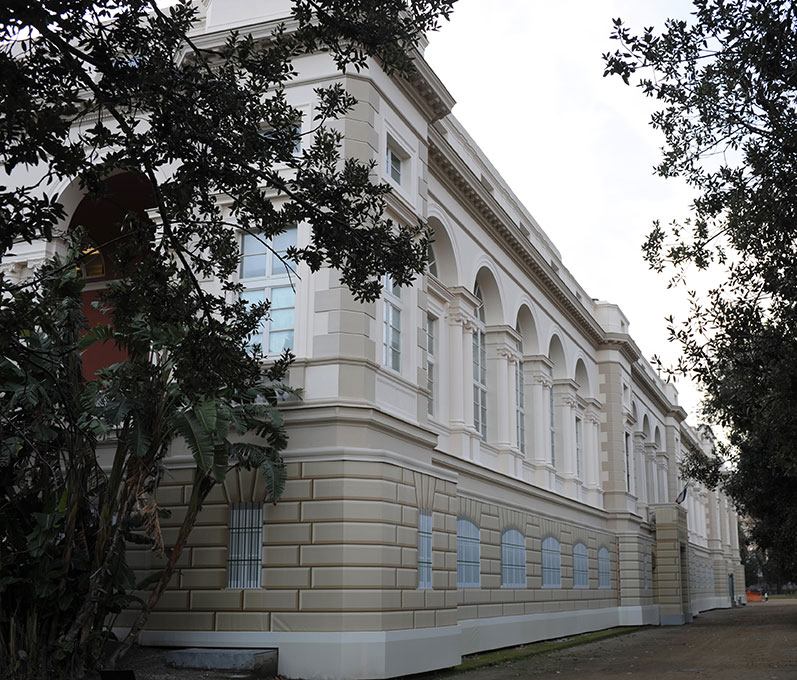The phrase 'developmental biology' became popular in the late 1950s, when embryology was in a transition phase and the focus shifts from the chemical organizers to subcellular and cell-cell interactions, the exchange of 'information' between nucleus and cytoplasm and the genetic control of morphogenesis. New developments in molecular biology, especially after the proposal by François Jacob and Jacques Monod of the molecular model of regulation of gene expression, based on repression and induction, suggesting new interpretations of development as a process control in time of expression of a predetermined program in the fertilized egg. The new generation of biologists who work at the Zoological Station in the 50s and 60s century compares well with new problems and new experimental procedures. A. Tyler, T. Hultin and A. Monroy, showed that the control of the genetic program seems, at least in part, already predetermined in the non-fertilized egg, as the ribosomes on which is held the protein synthesis accumulating during oogenesis, but the expression of the messengers contained in them is blocked by particular proteins, which are then eliminated during the different phases of embryonic development. This allowed to integrate in the new historical context some observations made by J. Runnström always in Naples and SO Hörstadius, which had shown that the activation of the egg at fertilization produces the appearance of proteolytic enzymes.
After the pioneering work of Otto Loewi (Nobel Prize in 1936) that had shown that synaptic transmission was mediated by acetylcholine, Bernard Katz and Richard Miledi from the University College in London came to the Stazione Zoologica to study the relationship between calcium and release of neurotransmitters at synapses. Their experiments become classics: thanks to the use of microelectrodes the two researchers discovered the so-called 'membrane potential', showing that acetylcholine is released into 'packets' in very small quantities when the synapse is at rest, while when the termination synaptic is stimulated also increases the emission of a million times. The octopus, Octopus, turns out to be once again a unique material for studying the mechanisms of learning and memory, thanks to the inexhaustible availability of animals in Naples throughout the year. The Posillipo fishermen were able to carry up to 20 or more Octopus in excellent condition, and the station provides specially created tanks, built in a suitable space thanks to the financing of the British Science Research Council. This made possible to create a vast Zoological Station 'cephalopods facility', consisting of more than two hundred tanks in which as many Octopus can be maintained and observed individually.
Along with several collaborators, especially Bryan Boycott, Martin Wells and John Messenger, Young mapped the neural circuits of the brain and of the Octopus through ingenious experiments he explored the learning ability of these animals, and offers new interpretations of the neural mechanisms underlying memory.
From the very beginning, botanical research had been an important component of the scientific life of the Stazione Zoologica. The first guests of the institute were of German researchers who studied marine plants, in terms of ecological and systematic basis for later physiological, cytological, biochemical and cycles of life research. After an initial period as a member of the Department of Botany, since 1912, Georg Funk realized several periods of research in Naples, producing three major publications on the algae in the Mediterranean and giving the botanical research in Naples continuity which extended into the late '50s. The lasting impact of this type of study has been the contribution of an ecological dimension, from which other studies grew and found support. The monographs of Funk (1927, 1955) with the detailed description of the associations of algae, their distribution, reproductive cycles remain the benchmark for algae research in the Mediterranean. Moreover, the observations of Funk have served as a basis for the quantitative study of the changes produced in the ecosystem of the Gulf of Naples from urban and industrial development, which mainly affects the waters coastal waters.
In the early 50's botanical studies take up a great momentum, with new programs of ecological study of the distribution of algae, their cultivation, and especially with the research on various aspects of the life cycle and biochemical functions of Acetabularia.
With an even greater emphasis on Ecology, Botany in the decade 1960-70 begins to discuss new scientific questions relating marine environment. The Benthic Ecology and Biological Oceanography laboratories were established to develop ecological studies in the broad sense, including research on the chemical-physical factors as well as plant and animal communities, in particular benthic ecosystems.










